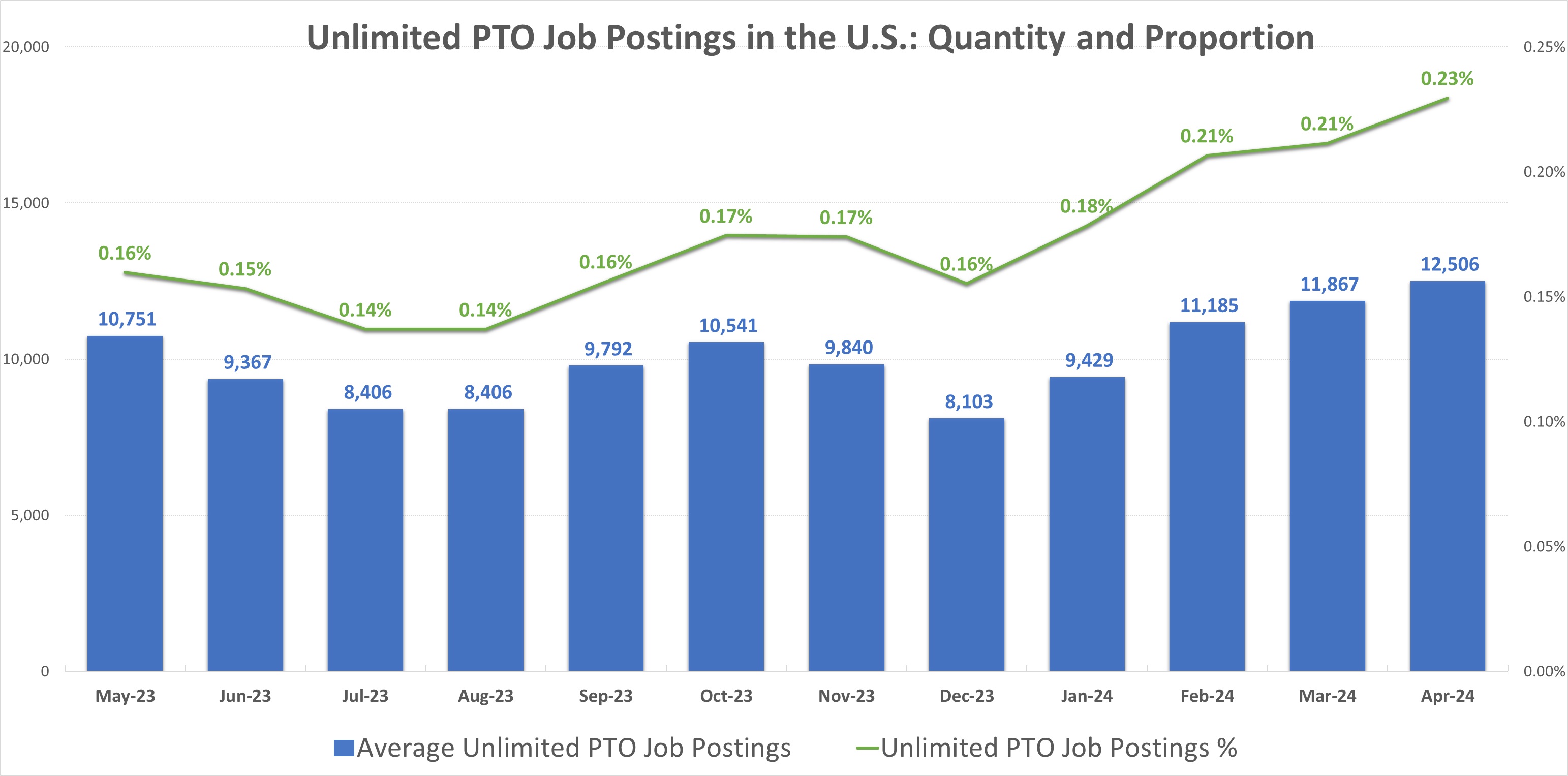The number of organizations offering unlimited paid time off (PTO) is slowly increasing across the US. As of April 2024, our data revealed 0.23%, or about 12,506 positions, advertised unlimited PTO as a perk. Though it is a minor fraction of total job postings, it has seen a 43.7% increase from the 0.16% recorded in May 2023, signaling a notable upward trend. Interestingly, around 21% of job listings that offer unlimited PTO include remote work options, while about 8% offer hybrid working.

Even though it’s still a rarity, unlimited PTO is on the rise and understanding the advantages and the types of roles and competitors that offer it can give companies a strategic edge. This benefit can help to attract and retain top talent, especially in highly competitive industries, and leads to significant cost savings by reducing the financial liabilities associated with traditional PTO policies. While unlimited PTO isn't widespread (yet), it’s a trend worth watching for organizations looking to stay ahead.
Types of roles and companies offering unlimited PTO
The range of roles with unlimited PTO varies, but some jobs pop up more often than others. These include positions like wealth management professionals, full-stack engineers, product marketing managers, account executives and senior software engineers.
.png?width=1310&height=550&name=The%20Growth%20of%20Unlimited%20PTO%20in%20the%20Modern%20Workplace%20chart-bar-position%20(10).png)
Notably, these roles typically have advertised salaries around the $100,000 mark as of April 2024.
.png?width=1310&height=550&name=The%20Growth%20of%20Unlimited%20PTO%20in%20the%20Modern%20Workplace%20chart-bar-cbsa%20(7).png)
When we look at the industries that offer unlimited PTO as a perk, there’s a diverse spread, but certain sectors stand out. For example, companies like Savvy Wealth in finance, Centered Mind Therapy in the therapy field, Epic Games in gaming, Heartland Dental in healthcare, OpenAI and Anthropic in tech are leading the charge in offering unlimited PTO.
Benefits of unlimited PTO
There are many benefits to businesses that provide unlimited PTO. It can be a powerful tool for attracting and retaining talent, especially top-tier candidates who prioritize work-life balance and flexibility. Moreover, by improving employee satisfaction and reducing the likelihood of burnout, unlimited PTO can help lower attrition rates, which translates to cost savings in recruitment and training.
Moreover, unlimited PTO can lead to substantial cost savings. Traditional PTO policies mean companies must account for the financial liability of accrued vacation days, money that must be paid out when employees leave. These accruals are typically recorded as a liability on the balance sheet, representing a future obligation. By switching to unlimited PTO, companies can eliminate this liability, as there are no accrued days to be paid out.
Guidelines for implementing an unlimited PTO policy in your company
If you're thinking about switching to unlimited PTO, it’s important to handle the transition with care. Here are a few points to consider:
-
Set clear expectations: Unlimited PTO gives employees flexibility, but clear guidelines are necessary to avoid misuse, especially for employees in client-facing roles.
-
Supportive culture: The success of an unlimited PTO policy depends largely on company culture. Managers should lead by example by taking adequate time off and encouraging their teams to do the same. Openness from leadership about their own PTO usage sets a positive example.
-
Educate employees: Employees must understand the importance of taking time off to prevent burnout. Some companies even require a minimum number of PTO days to ensure employees truly benefit from the policy.
While only a small portion of total jobs in the US currently offer unlimited PTO, our data points to a growing trend. Unlimited PTO is not suitable for every role and company, and it is more likely to fit best in environments where work is more project-based or output-focused, rather than strictly time-bound. By drawing in top talent, cutting financial liabilities, and promoting a healthier work-life balance, unlimited PTO is helping to revolutionize the way companies approach time off policies.
